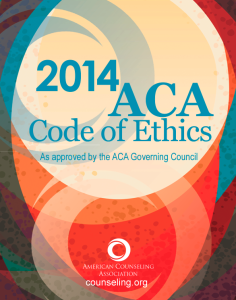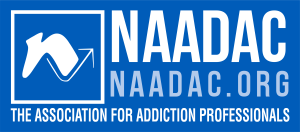1.4 Ethical Codes and Standards
Professional Codes of Ethics
As previously mentioned, both the ACA and NAADAC have comprehensive ethical codes to guide the professional conduct of counselors in their respective fields, ensuring the highest standards of care, professional integrity, and client welfare. The ACA Code of Ethics is organized into nine sections: (a) the counseling relationship, (b) confidentiality and privacy, (c) professional responsibility, (d) relationships with other professionals, (e) evaluation, assessment, and interpretation, (f) supervision, training, and teaching, (g) research and publication, (h) distance counseling, technology, and social media, and (i) resolving ethical issues (ACA, 2014). The NAADAC Code of Ethics, explicitly tailored for addiction professionals, is structured around principles reflecting the unique challenges and responsibilities in substance use disorder counseling. These principles include the (a) counseling relationship, (b) confidentiality and privileged communication, (c) professional responsibilities and workplace standards, (d) working in a culturally diverse world, (e) assessment, evaluation, and interpretation, (f) e-therapy, e-supervision, and social media, (g) supervision and consultation, and (h) resolving ethical concerns (NAADAC, 2021).


The ACA and NAADAC ethical codes share essential similarities that reflect the critical values of the counseling profession. One of the main areas where they align is the strong emphasis on protecting client confidentiality. Both codes provide clear rules on keeping client information private, understanding that trust is the foundation of a successful counseling relationship. Confidentiality can only be broken in certain situations, like when a client is at risk of harming themselves or others. Even then, both codes stress that counselors must handle the situation carefully and let clients know about these limits from the beginning.
Another fundamental similarity is the focus on maintaining professional competence. Both codes require counselors to continue learning and improving their skills to keep up with changes in the field, especially when working with complex issues like co-occurring disorders. Counselors are expected to know their knowledge’s limits and seek supervision or make referrals when necessary to ensure clients receive the best possible care. Staying competent helps the clients and keeps the counseling profession credible and trustworthy. Both codes also highlight the importance of following broader ethical guidelines. These include avoiding conflicts of interest, maintaining healthy boundaries with clients, and not using the counseling relationship for personal gain. Counselors must act with honesty and integrity at all times, which helps them manage difficult situations in counseling, especially when working with vulnerable clients or complicated cases like co-occurring disorders.
Cultural sensitivity and competence are also significant in the ACA and NAADAC ethical codes. The codes recognize that clients come from diverse backgrounds, and counselors must understand and respect these differences. Counselors are encouraged to reflect on their biases and work to provide care that considers each client’s unique cultural background, including factors like race, ethnicity, gender, sexuality, and socioeconomic status. Both codes call for respectful and effective counseling for people from all walks of life.
Regarding the use of technology in counseling, both codes acknowledge the rise of digital tools like telehealth and online counseling. They stress that technology should be used responsibly, with particular attention to protecting client confidentiality and ensuring clients understand the limits and risks of digital counseling. The ACA Code of Ethics goes into more detail on this topic, offering specific guidelines on using technology ethically in counseling. Counselors are encouraged to ensure that technology does not reduce the quality of care or compromise ethical standards.
Overall, the ACA and NAADAC ethical codes provide a solid framework that guides counselors through the ever-changing ethical challenges of the profession. Both codes help counselors protect their clients, uphold professional standards, and adapt to new situations, whether dealing with cultural diversity or using technology in therapy. While the two codes may differ, they emphasize high ethical standards to ensure counselors provide effective and ethical care, mainly when working with complex issues like co-occurring disorders or diverse client populations. Throughout this textbook, we will discuss the components of the ethical codes in great detail.
State and Federal Regulations
State and federal regulations in SUD and mental health counseling ensure that counselors meet specific standards of care, protect client rights, and promote public safety. Regulations are legally binding and enforceable through the judicial system. Regulations are designed to protect public safety and welfare by setting minimum standards of practice and ensuring that counselors meet specific qualifications. Violating laws can result in legal consequences such as fines, sanctions, or loss of licensure. State regulations often include licensure and certification requirements, which mandate that counselors possess specific educational qualifications, complete supervised clinical experience, and pass relevant examinations. These regulations vary by state but aim to ensure that counselors are competent and adhere to ethical standards. State boards oversee the licensure process, investigate complaints, and enforce disciplinary actions when necessary. Additionally, states may have specific laws governing the scope of practice, continuing education requirements, and telehealth services in counseling.
On the federal level, regulations impact SUD and mental health counseling through various laws and funding programs. The Health Insurance Portability and Accountability Act (HIPAA) sets national standards for protecting patient privacy and the confidentiality of health information. Additionally, 42 CFR part 2 describes specific privacy and confidentiality guidelines for SUD counseling. The passage of the Affordable Care Act in 2010 expanded access to mental health and substance use disorder services by requiring insurance plans to cover these services as essential health benefits. The Substance Abuse and Mental Health Services Administration (SAMHSA) provides guidelines, funding, and resources to support SUD and MH treatment programs across the country. Federal regulations also include provisions from the Americans with Disabilities Act, ensuring that individuals with mental health and substance use disorders receive equitable treatment and are protected from discrimination. State and federal regulations create a comprehensive framework that upholds the quality and integrity of SUD and MH counseling practices, ensuring that clients receive safe, effective, and ethical care.
As discussed previously, when the difference between ethics, morals, and laws was highlighted, state and federal regulations differ from professional ethics. Ethics provide a framework for making professional judgments and maintaining the highest standards of practice, while regulations establish the mandatory requirements and boundaries within which counselors must operate. While ethical guidelines can sometimes be aspirational and open to interpretation, regulations are explicit and enforceable. Both are essential for ensuring that counseling practice is safe, effective, and aligned with societal expectations.
Organizational Policies
Organizational policies in the context of counseling ethics refer to the specific rules, guidelines, and procedures established by counseling agencies, mental health organizations, educational institutions, and other entities where counseling services are provided. These policies are designed to ensure that the profession’s ethical standards are upheld within the specific context of the organization’s operations, providing a framework for counselors to deliver services consistently and ethically while addressing the unique needs and circumstances of the institution. Typical areas covered by institutional policies include confidentiality and privacy, informed consent, supervision and training, crisis management, client rights and responsibilities, professional boundaries, cultural competence, ethical decision-making, technology use, and compliance with laws and regulations.
Policies can differ significantly between organizations and are based on the type of services provided, the population served, and the organizational structure. For example, a substance use disorder counseling program might have specific policies related to return-to-use, expectations around abstinence, and how providers respond when interfacing with a client who might be under the influence of mood-altering substances. Similarly, a mental health organization that provides crisis intervention services may have more detailed protocols for crisis management and immediate response procedures than a community mental health clinic. Finally, organizations that serve diverse populations emphasize cultural competence and inclusivity in their policies, reflecting their commitment to addressing the specific needs of their clients.
The use of technology in counseling also varies, with some institutions having comprehensive guidelines for telehealth services and electronic communication. In contrast, others might have more restrictive policies due to concerns about confidentiality and security. Moreover, larger organizations or those with a higher volume of staff and clients might have more formalized and extensive policies to ensure consistency and accountability, while smaller practices might operate with more flexibility and fewer formal procedures. These variations highlight how institutional policies are tailored to fit different counseling settings’ specific operational and ethical requirements, ensuring that counselors can provide effective, ethical, and client-centered care.
Key Takeaways
- Professional organizations create, publish, and maintain ethical codes that serve as frameworks and guides for standards of care and practice in a particular field.
- State and federal laws and regulations are not always congruent with ethical codes. In general, laws and regulations provide specific, actionable steps a person must take in certain situations. Adversely, ethical codes provide general guidance as to how a person might consider engaging when faced with ethical dilemmas.
- Organizational policies exist within specific organizations and agencies. Counselors must use discretion when considering how to respond to a particular situation based on ethical codes, law, and organizational policy.

